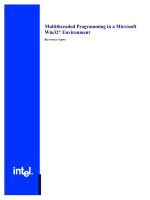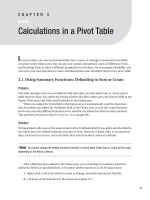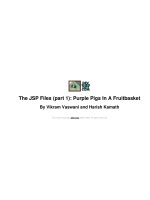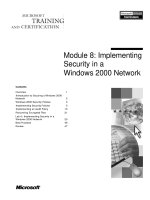Evaluating Variables in a Flat File
Bạn đang xem bản rút gọn của tài liệu. Xem và tải ngay bản đầy đủ của tài liệu tại đây (42.16 KB, 2 trang )
181
■ ■ ■
CHAPTER 26
Evaluating Variables
in a Flat File
O
ne common scripting technique is to create a flat file that is one of a potential
number of canned messages for users to receive—messages such as notifications of
downtimes, changes in the environment, or use of system quota. (I consider a flat file
simply a file that contains text.) Based on the logic in the script, the proper message
will be sent to the user or users. A more advanced implementation of this technique
provides a template that refers to environment variables and contains customizable
elements so the message can be tailored specifically to the recipient.
In Chapter 36, I present a script that checks every morning for user passwords that are
aging and therefore should be changed. In that script, when a password has reached the
predetermined cut-off age, the script sends an e-mail to the account owner to state that the
account will be locked if the owner doesn’t update her password. The script annoys the user
every day for a couple of weeks, after which the account is locked. After that, if the user
wants to use the account she would have to call and explain why she didn’t heed the friendly
e-mail warnings.
The canned template file looks like this:
$ENVIRONMENT account password for \\"$USERID\\" expires in $REMAINING day\\(s\\)
==============================================================
++ ACTION NEEDS TO BE TAKEN OR YOUR ACCOUNT WILL BE LOCKED ++
++ IN $REMAINING day\\(s\\) ++
==============================================================
If the password isnt changed within $REMAINING day\\(s\\), account will be locked.
Instructions for changing passwords are located at:
\\<a href=\\" /> />If you are unable to change your password, please call the Help Desk.
182
CHAPTER 26
■
EVALUATING VARIABLES IN A FLAT FILE
If you no longer need this account, please let us know so we can remove it.
System Administration
Note in particular the shell variables (ENVIRONMENT, USERID, and REMAINING) and their
escape sequences. When the script executes, the account expiration date for each possi-
ble USERID is checked, and the script determines how many days REMAINING there are
before the account is frozen. The ENVIRONMENT variable specifies the environment from
which the message is being sent. The occurrences of these variables must be replaced
with their values before the script is run and the message is sent. Likewise, each escape
sequence \\ evaluates to a single backslash that causes the following special character to
be escaped so that it is treated as plain text when the script executes.
For each user with a soon-to-expire password, the template file is evaluated at runtime
to replace the included variables with their contents. The code to perform the replace-
ments in each case is fairly simple. It consists of one small loop that looks at each line
in the flat file and replaces any variables with their assigned values. You can easily modify
the code for other purposes—for example, to display the modified file.
cat $flat_file | while read a_line
do
place_holder=`eval echo $a_line`
echo $place_holder
done | $MAIL -s "$ENVIRONMENT UNIX Account Notification" $RECIPIENT
The loop processes each line of the file using the eval statement, which causes
the variables to be replaced with their string values. The expanded line is assigned to the
variable place_holder so that it can be echoed to standard output. Once all lines have
been processed, the complete output is sent via e-mail to the specified RECIPIENT by the
e-mail command in the final element of the command pipeline. The specific e-mail
command is up to you; a couple of common ones are mailx and mail, depending on your
operating system.
This technique has many potential uses. The example script here is much like a tradi-
tional mail merge where you customize the message based on specific users. You could
also use this technique for creating and maintaining configuration for an application, or
custom files for individual users patterned after a default file.









